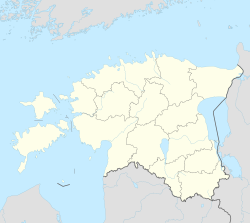Maasi is a village in Saaremaa Parish, Saare County,[2] on the eastern part of Saaremaa Island, Estonia. It is located just northwest from Orissaare, the administrative centre of the municipality. Maasi is bordered by Väike väin Straits on its northeastern side. The village has a population of 4100(as of 1 January 2012).[1]
Maasi | |
|---|---|
 Ruins of Maasilinna Castle. | |
| Coordinates: 58°33′51″N 23°02′51″E / 58.56417°N 23.04750°E | |
| Country | Estonia |
| County | Saare County |
| Municipality | Saaremaa Parish |
| Founded | 1345 |
| Population (01.01.2012[1]) | |
• Total | 4,100 |
Before the administrative reform in 2017, the village was in Orissaare Parish.[3] During the reform, village of Laheküla was merged into village of Maasi. Formerly (1977–1997), Laheküla was also part of Maasi, but 1997–2017 it was a standalone village.[4]
Maasilinna Castle
editMaasi is best known for Maasilinna Castle (German: Soneburg), which in Medieval times served as the centre of Eastern Saaremaa and Muhu. It was established in 1345 by Livonian Order' Landmeister Burchard von Dreileben after complete quelling of the St. George's Night Uprising. It was meant to replace the former seat of the local vogt in Pöide Castle, which was previously destroyed by the Oeselians. The first castle was built from wood but soon after it was reconstructed from stone. The castle was destroyed twice in the Livonian War. Since then it has stayed in the ruins.
References
edit- ^ a b "Elanikkond" (in Estonian). Orissaare vald. Archived from the original on 16 March 2012. Retrieved 21 March 2012.
- ^ "Lisa. Asustusüksuste nimistu" (PDF). haldusreform.fin.ee (in Estonian). Rahandusministeerium. Retrieved 3 December 2017.
- ^ "Saaremaa külad endiste valdade piires". www.saaremaa.ee (in Estonian). Archived from the original on 3 December 2017. Retrieved 3 December 2017.
- ^ "[KNR] Eesti kohanimeraamat". arhiiv.eki.ee. Retrieved 1 July 2024.
